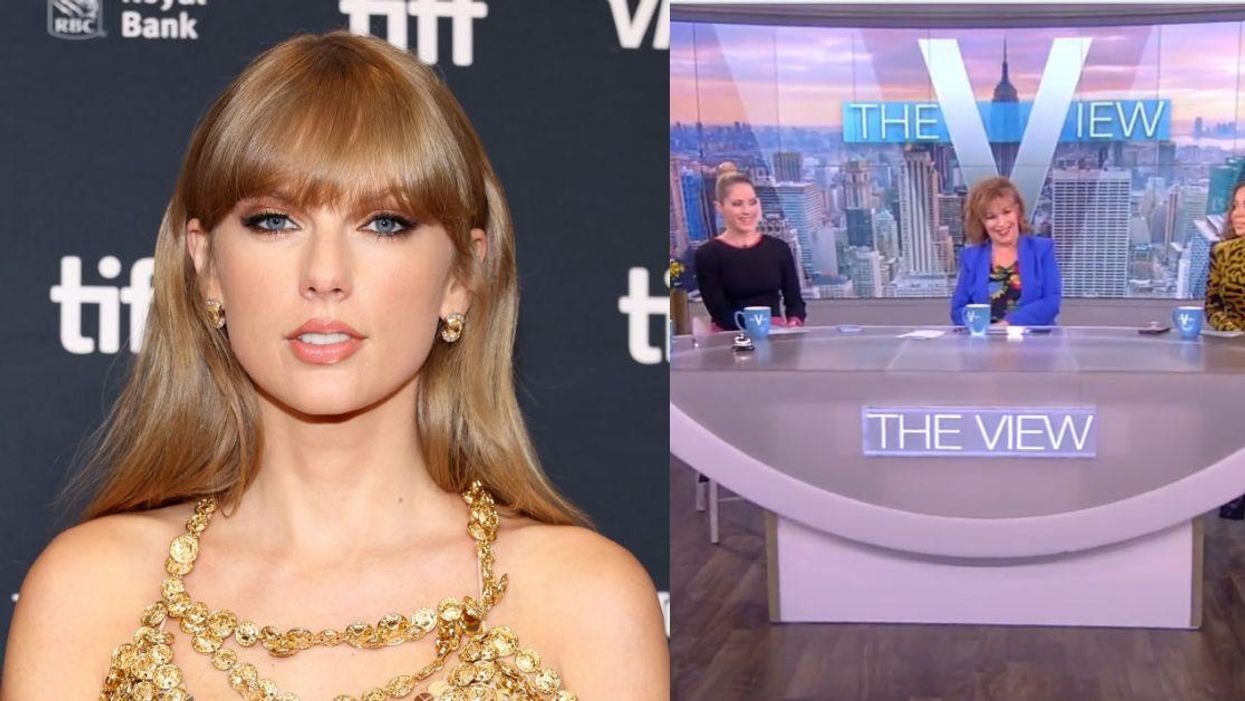The View co-hosts came to Taylor Swift's defense after she removed a controversial scene from her "Anti-Hero" music video that caused backlash.
"Anti-Hero" is the debut single from her critically-lauded and highly-anticipated new album, Midnights, which dropped last Friday.
The hit song co-written with her longtime collaborator Jack Antonoff explores issues of anxiety and self-loathing, which is suggested in the following lyrics.
"It's me
Hi
I'm the problem, it's me
At teatime
Everybody agrees"
"I'll stare directly at the sun but never in the mirror
It must be exhausting always rooting for the anti-hero
The controversial scene from the "Anti-Hero" music video–which Taylor wrote and directed and racked up 15,040,098 views on its first day of release–showed the singer stepping onto a scale and seeing the word, "fat," instead of her weight number.
When the scene was slammed with criticism online–including comments accusing the singer of being "fatphobic"–it was replaced with an updated scene that doesn't show the word on the scale but shows her party-girl alter ego looking at the result disapprovingly and shaking her head.
The updated music video for "Anti-Hero" can be seen here:
Taylor Swift - Anti-Hero (Official Music Video)youtu.be
Here is the original scene cut from the video.
On Tuesday's episode of The View, co-host Sunny Hostin said of the critics:
"They missed the point."
"For someone who's an artist, she gets to have agency over her artistry. She was describing a personal experience, and quite frankly, it's a personal experience a lot of women experience."
Hostin continued:
"I've experienced it, and men. You get on the scale and you're a perfectly normal weight and all you see is fat, all you see is, 'Oh my gosh, I'm five pounds heavier than I should be.'"
Whoopi Goldberg chimed in, urging the public to "just let her have her feelings."
"Why are you wasting your time on this? You all want to say something about Taylor Swift, leave her a** alone!" she said and encouraged those who objected to the song should steer clear of it.
The discussion made Joy Behar recall a conversation she had with former View co-host Star Jones about how empowering it is to re-contextualize a word that has negative connotations.
"Take the word back," said Behar.
"If you feel like saying you're fat, say you're fat. It's like 'b*tch,' we own the word now, they can't really use it against us."
You can see the segment from The View below.
Loyal fans, or "Swifties," also offered support for their idol and asserted she wasn't the problem, but rather:
"Hi. It's You. You're the problem."
Swift described "Anti-Hero" as one of her favorite, as well as, most personal songs to date on an Instagram post.
"I don't think I've delved this far into my insecurities in this detail before," she told followers.
"I struggle a lot with the idea that my life has become unmanageably sized and, not to sound too dark, I struggle with the idea of not feeling like a person."
"We all hate things about ourselves, and it's all of those aspects of the things we dislike and like about ourselves that we have to come to terms with if we're going to be this person."
Swift has opened up about her struggles with bodily self-image and eating disorder before in the Netflix documentary, Miss Americana.
In the 2020 film, she mentioned how, on a couple of very rare occasions, she became insecure after looking at pictures of herself "where I feel like I looked like my tummy was too big, or… someone said that I looked pregnant … and that’ll just trigger me to just starve a little bit—just stop eating.”
Referring back to that sequence in the film, Taylor told Variety:
“I remember how, when I was 18, that was the first time I was on the cover of a magazine, and the headline was like ‘Pregnant at 18?’ And it was because I had worn something that made my lower stomach look not flat."
"So I just registered that as a punishment. And then I’d walk into a photo shoot and be in the dressing room and somebody who worked at a magazine would say, ‘Oh, wow, this is so amazing that you can fit into the sample sizes."
"Usually we have to make alterations to the dresses, but we can take them right off the runway and put them on you!’ And I looked at that as a pat on the head."
She added:
"You register that enough times, and you just start to accommodate everything towards praise and punishment, including your own body.”








 Roberto Schmidt/AFP via Getty Images
Roberto Schmidt/AFP via Getty Images





 u/pizzaratsfriend/Reddit
u/pizzaratsfriend/Reddit u/Flat_Valuable650/Reddit
u/Flat_Valuable650/Reddit u/ReadyCauliflower8/Reddit
u/ReadyCauliflower8/Reddit u/RealBettyWhite69/Reddit
u/RealBettyWhite69/Reddit u/invisibleshadowalker/Reddit
u/invisibleshadowalker/Reddit u/Wishnik6502/Reddit
u/Wishnik6502/Reddit u/kateastrophic/Reddit
u/kateastrophic/Reddit u/blking/Reddit
u/blking/Reddit u/SlagQueen/Reddit
u/SlagQueen/Reddit u/geezeslice333/Reddit
u/geezeslice333/Reddit u/meertaoxo/Reddit
u/meertaoxo/Reddit u/crystal_clear24/Reddit
u/crystal_clear24/Reddit u/stinkpot_jamjar/Reddit
u/stinkpot_jamjar/Reddit
 u/Bulgingpants/Reddit
u/Bulgingpants/Reddit
 @hackedliving/TikTok
@hackedliving/TikTok @hackedliving/TikTok
@hackedliving/TikTok @hackedliving/TikTok
@hackedliving/TikTok @hackedliving/TikTok
@hackedliving/TikTok @hackedliving/TikTok
@hackedliving/TikTok @hackedliving/TikTok
@hackedliving/TikTok @hackedliving/TikTok
@hackedliving/TikTok @hackedliving/TikTok
@hackedliving/TikTok @hackedliving/TikTok
@hackedliving/TikTok @hackedliving/TikTok
@hackedliving/TikTok
 @vanderjames/Instagram
@vanderjames/Instagram @vanderjames/Instagram
@vanderjames/Instagram @vanderjames/Instagram
@vanderjames/Instagram @vanderjames/Instagram
@vanderjames/Instagram @vanderjames/Instagram
@vanderjames/Instagram @vanderjames/Instagram
@vanderjames/Instagram @vanderjames/Instagram
@vanderjames/Instagram @vanderjames/Instagram
@vanderjames/Instagram @vanderjames/Instagram
@vanderjames/Instagram @vanderjames/Instagram
@vanderjames/Instagram